R | RESPECT FOR HUMAN RIGHTS, EQUAL OPPORTUNITIES AND STAFF ENGAGEMENT
2-23
Building a comfortable, fair, and encouraging work environment is an overriding priority of Moscow Exchange Group. Over the past several years, Moscow Exchange has put considerable efforts into building a culture of respect and trust in the workplace and increasing employee satisfaction and engagement. Today, the Group continues to take part in dynamic activities to that end.
Care for our employees has been a key focus area of Moscow Exchange throughout 2022, which is reflected in the Sustainability Roadmap. Priority areas include pursuing gender equality, encouraging a healthy work-life balance, increasing the flexibility of the working environment, and ensuring the physical and emotional well-being of staff. The Group’s management seeks new approaches to developing expertise, managing the agenda, and setting ambitious and quantifiable objectives.
Moscow Exchange Group’s objectives and the UN Sustainable Development Goals:
- SDG 4.4 Develop employees’ professional and technical skills
- SDG 4.7 Train employees to effectively manage sustainability within the Group
- SDG 5.5 Ensure gender equality in the Group
- SDG 8.5, 8.6, 8.7, 8.8 Ensure decent working conditions for employees
2022 Highlights
This subsection provides a description of the activities and initiatives of the Moscow Exchange Group to create decent working conditions, a safe and comfortable workplace environment, and the basic principles that ensure a culture of development and equal opportunities.
Particular attention is paid to the Group’s efforts to train and develop employees, including raising employee awareness of sustainability issues.
For 2020, 2021, and 2022 metrics, see the Respect for Human Rights, Equal Opportunities and Staff Engagement subsection of the Sustainability Data section. For key policies, procedures, and departments, see the relevant subsection of the Sustainability Approaches and Procedures section.
2-7
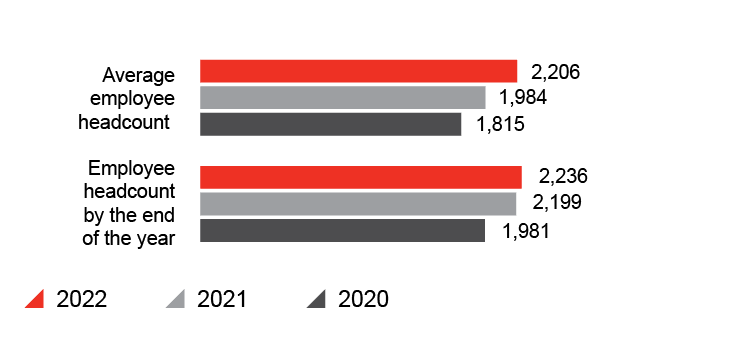
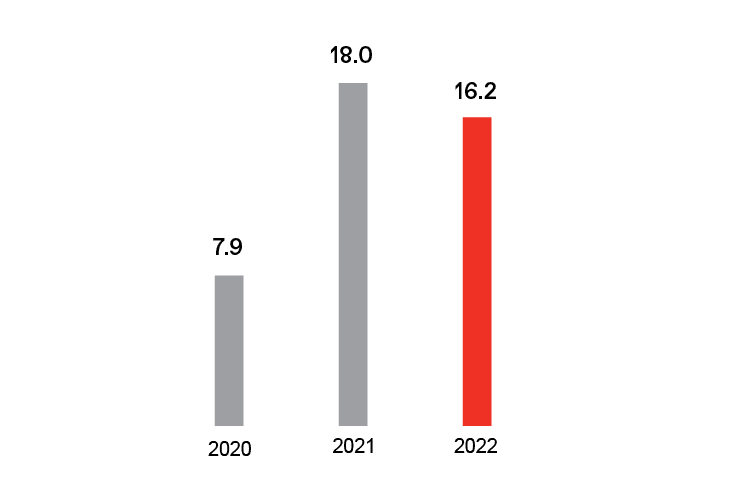
401-1
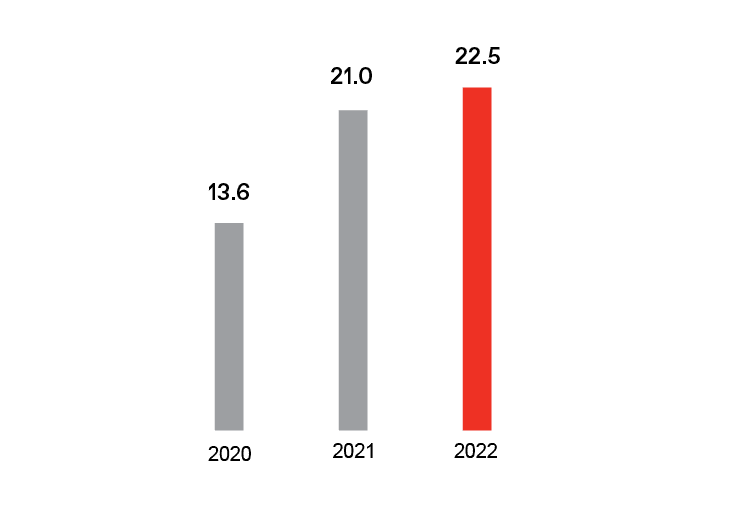
In 2022, Moscow Exchange Group was implementing a project to introduce an electronic document management (EDMS) for human resources. The project is scheduled to be completed in 2023.
In 2022, a project was also implemented to optimise the Group’s business processes by establishing Competence Centres for supporting functions.
Staff engagement and performance
The total employee headcount of the Moscow Exchange Group increased by 1.6% in 2022. The staff turnover rate was 16.2%, a decrease of 1.8 p.p. compared to 2021. The rate remains relatively high due to external events in 2022, while being significantly lower than the average turnover rate for the financial sector in Moscow (based on data for
By analysing the reasons for employee resignations, the Group takes measures to reduce turnover on this basis. To this end, employee engagement is monitored. In 2020, the Supervisory Board of the Exchange approved a new long-term incentive programme for
Every year, the Group conducts a comprehensive study of employee engagement. In 2022, 84% of the staff took part (Moscow Exchange – 82 %, NCC – 92 %, NSD – 84 %) Polling yielded the following results:
engagement – 86.2 %;loyalty – 84.4 %;satisfaction – 79.1 %.
Key areas of development were identified through the survey. In order to create a plan to enhance the efficiency of operations, the Group organised focus groups, identifying critical areas for employees, such as HR issues, career planning, training, remuneration, and work-life balance. Relevant activities and discussions were subsequently arranged.
Learning and development
The employees of have access to an extensive library of training materials.
404-2
Moscow Exchange’s training and development system includes educational programmes, workplace development tools and self-study. However, the choice of a particular type of training is left to the employees themselves. To meet their development needs, they can use modern technology, corporate resources and other opportunities such as cross-functional internships, mentoring, wikis (websites), and an e-library.
In 2022, the main focus of training was to maintain business continuity and to substitute import. In 2022, 24% of employees participated in various educational programmes and sessions.
IT communities in the Group were further developed: 22 IT communities were functioning in 2022, and six meetups on professional community topics were organised, with more than 300 employees taking part therein.
Beginning 2020, onboarding training for new employees takes place in an online format. The training includes topics that allow the newcomer to quickly get up to speed. The newcomer course includes webinars on the operations of all Group companies, HR processes, compliance, information security, and corporate life. In 2022, all new hires remarked on the high quality of the onboarding process.
Diversity and equal opportunity
405-1
Gender structure of the Group’s employees by levels is shown below. More details on this information is contained in the Sustainability Data section.
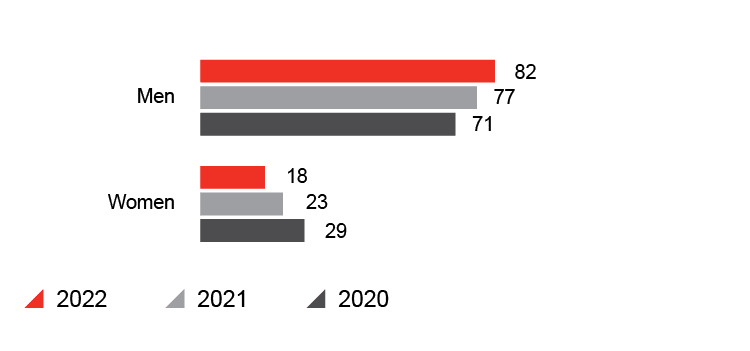
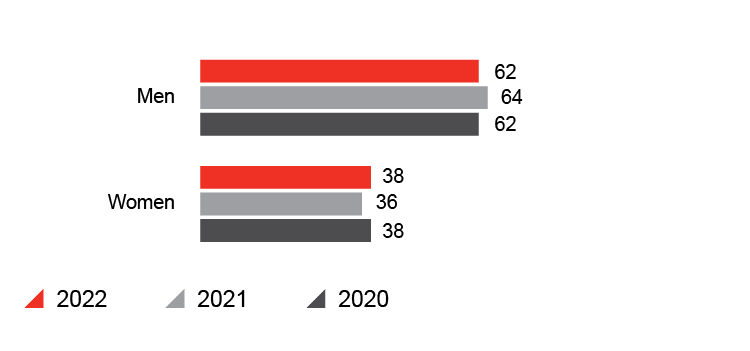
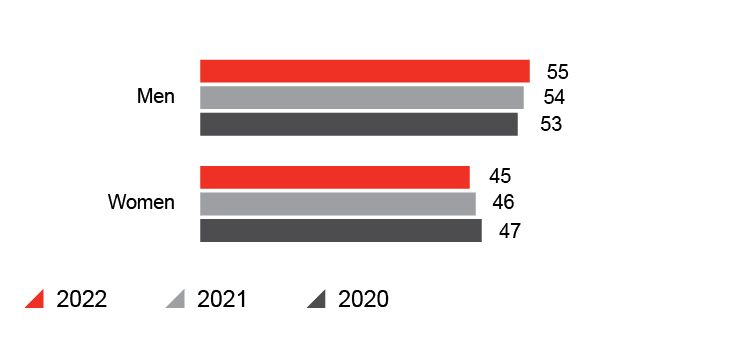
Moscow Exchange Group focuses on the social and cultural diversity of its employees, providing them with equal opportunities in terms of training, career development, and social benefits. This approach leads to a more productive and comfortable work environment.
The Group follows the recommendations of the Bank of Russia in forming and maintaining the continuity of the Supervisory Board; including based on the principle of gender diversity.
In terms of the percentage of women among the workforce, the Group adheres to global best practices. Despite some challenges, particularly the fact that there are far fewer women in the Russian IT sector than men, the Group takes active steps to hire women in its IT departments.
202-1
Moscow Exchange Group provides its employees with a competitive level of remuneration. In 2022, the average salary of specialists and workers of the first grade, including bonuses, was 4.22 times higher than the minimum wage set in Moscow as of 1 January 2022.
In 2022, Group companies unified HR processes and developed and approved new documents regulating the remuneration system in all Group companies.
On 26 January 2023, a Memorandum on Social Responsibility was approved, declaring respect for human rights, gender equality and socio-cultural diversity, and condemning all forms of physical violence, verbal abuse and sexual harassment.
In 2022, a survey of Group employees on gender equality was conducted for the first time to identify priority policy areas for promoting gender equality at the Moscow Exchange Group. Similar surveys are planned to be conducted on a regular basis.
During the reporting period, a Moscow Exchange working group on gender equality was formed and a kick-off meeting was held to discuss the Moscow Exchange’s current position in terms of gender aspects of operations, including in comparison with foreign exchanges, proposals on improving HR policies with respect to respecting women’s rights and supporting maternity and paternity.
In 2022, a programme of additional social benefits and compensation for employees selected as key experts of the units was launched.
Occupational health, security protection, safety and well-being
403-6 403-3
Under certain conditions, employees are offered such opportunities as working from home or flexible working hours. In accordance with the Labour Code of the Russian Federation and at the request of the employee, the employer may establish part-time work for pregnant women, for a parent (guardian, custodian) with a child under the age of 14 or a disabled child under the age of 18, and for employees caring for a sick family member. Women and men (at the choice of the family) are given parental leave to care for a child up to three years of age; mothers who start work early are given breaks to feed their child up to one and a half years of age; and additional four days off per month with pay to care for a child with a disability.
Although working conditions at Moscow Exchange Group are not associated with high risks of injury and occupational disease, the Group invests in maintaining a safe working environment and maintaining the health and well-being of its employees.
403-9 403-10
Over the last three years, no occupational injuries or diseases have been reported in the Group’s companies. Also, the Group is not aware of any cases of occupational injuries or diseases among contractors working at Moscow Exchange sites.
In 2022, Moscow Exchange Group did not record any cases that can be classified as micro-injuries or occupational accidents in accordance with the Russian Labour Code.
The cases of employees applying for voluntary health insurance, including to corporate doctors, relate to personal health conditions of employees that are not related to the company’s operations.
A procedure for recording and investigating accidents and micro-injuries at Moscow Exchange Group is currently being developed with subsequent approval as a local regulatory document.
Plans for 2023
Moscow Exchange will continue to work to maintain decent working conditions for its employees. At the same time, given the challenging foreign policy environment, the Group does not rule out the possibility of adjusting plans, including those included in the Sustainability Roadmap. Nevertheless, Group companies will continue to develop key initiatives planned for 2023 and beyond, adapting them to the new environment. Sustainability projects that are already underway are likely to continue. The Group’s management will do its utmost to preserve jobs and the social programmes most important to employees.
- continuing the implementation of the working time mobility programme;
- conducting an analysis of the emotional health problems of employees and possible solutions;
- carrying out a human rights risk assessment.
The key areas of activity in the area of HR management for 2023 are:
- development of corporate culture, including updating corporate values;
- development a Long-Term Management Incentive Programme for 2023-2025;
- further the development of the Supplemental Social Benefits and Compensation Programme for the Group’s key experts.
The Exchange will also continue to familiarise its employees with the sustainability agenda and help them develop their knowledge and skills in this area.
